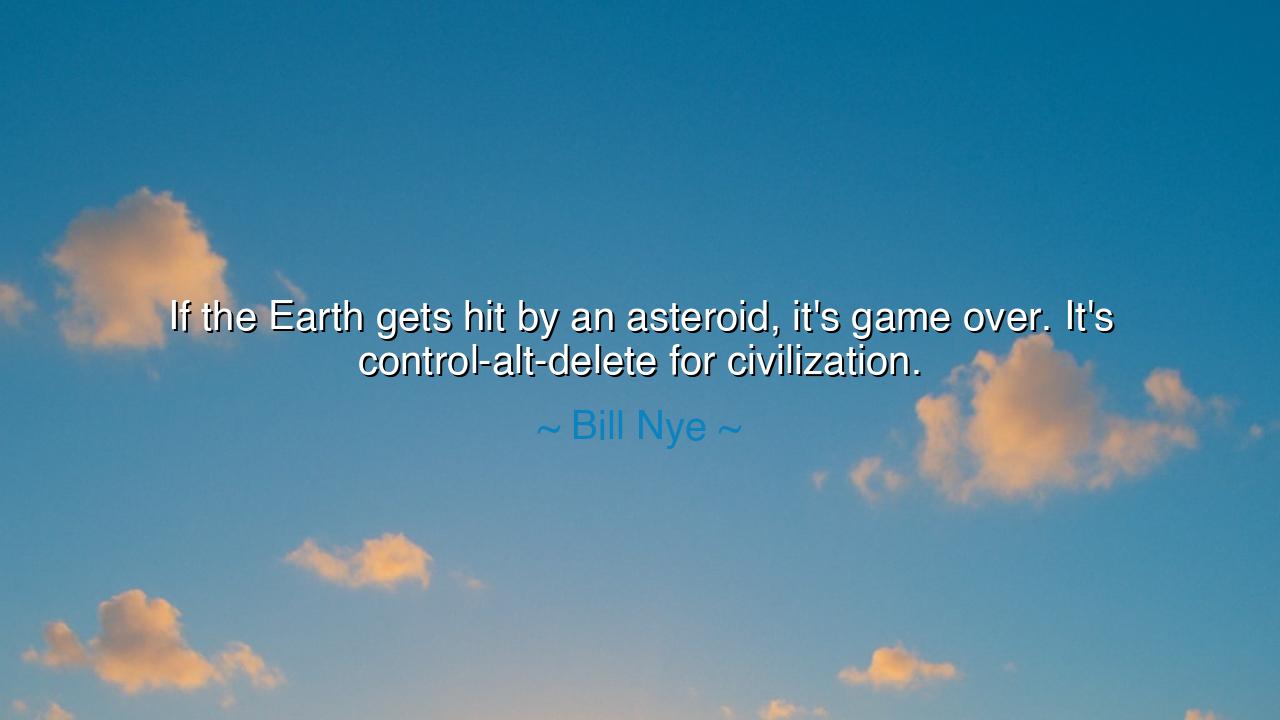
If the Earth gets hit by an asteroid, it's game over. It's
If the Earth gets hit by an asteroid, it's game over. It's control-alt-delete for civilization.






In the grand theater of the cosmos, where stars are born and die, where planets and comets swirl in their endless dance, there lies a sobering truth that Bill Nye captured with startling clarity: "If the Earth gets hit by an asteroid, it's game over. It's control-alt-delete for civilization." These words, stark in their simplicity, call us to recognize the fragility of the world we inhabit. For all our achievements, all our progress, we are but fleeting travelers on a small, spinning rock in an immense universe. And should a force from the cosmos strike, we are reminded that the systems we have built—our cities, our civilizations—are far more vulnerable than we often care to admit.
In ancient times, the world was seen as a place of cosmic balance, with gods governing the forces of nature and the heavens. The Greeks, for example, believed that the Fates spun the thread of life, and when their thread was cut, death and destruction followed. They understood that life, while full of triumphs and wonders, was also fragile and subject to forces beyond mortal control. They saw the world as a balance of forces: the gods above and the mortals below, each living within a fragile harmony that could be shattered at any moment. Nye’s words echo this ancient wisdom, reminding us that we, like the Greeks, are vulnerable to the forces of nature, to the unpredictable cosmos, which can bring our civilization to an abrupt and catastrophic end.
The ancients also feared natural disasters—earthquakes, floods, and fires—as signs of divine retribution or cosmic upheaval. The tale of Noah’s Ark, for instance, tells of a flood that wiped out most of humanity, leaving only a small group to survive and start anew. Similarly, the Romans feared that the fall of their empire could come not just from within, but from the unpredictable forces of the world—barbarians, disease, or even the wrath of the gods. The collapse of civilizations, though often seen as the result of internal decay, was also recognized as a consequence of forces beyond human control. Nye’s modern reflection on the possibility of an asteroid impact serves as a reminder that, just as the ancients feared the forces that lay beyond their understanding, we too must acknowledge that our civilization exists in a delicate balance with the universe.
Consider the story of the dinosaurs, those majestic creatures that once roamed the Earth in great numbers. Their reign came to a sudden and devastating end around 66 million years ago, likely due to an asteroid impact. The evidence of this impact, with its massive crater in the Yucatán Peninsula, is a stark reminder of the vulnerability of life on Earth. The dinosaurs, once the dominant force on the planet, were wiped out in an instant, their civilizations of nature destroyed by a cosmic event far beyond their control. This cosmic event, while tragic for the life forms it ended, paved the way for the rise of mammals and eventually, humans. This story underscores Nye’s point: that while we may build great civilizations, our fate is always tied to the unpredictable forces of the cosmos, which can, in an instant, reset the balance of life on Earth.
In our modern era, we have come to see ourselves as the masters of the world we inhabit. We have built cities that reach for the heavens, we have harnessed the power of the atom, and we have sent men to the moon. We believe ourselves to be invincible, disconnected from the forces that once threatened our ancestors. Yet, in this belief, we may be blind to the larger truth that Nye articulates. Civilization, as we know it, is not immune to the forces of nature. Our cities, our technology, and our achievements are fragile, and in the grand sweep of time, they are as vulnerable as the civilizations of the past. The idea that an asteroid, a force from the heavens, could wipe us out in an instant reminds us that we must remain humble in the face of nature’s power.
The lesson here is not to live in fear, but in awareness. Nye’s words remind us that, just as the ancients understood the fragility of life and the unpredictability of the world, so too must we acknowledge that our time on Earth is finite, and our civilization is at the mercy of forces beyond our understanding. While we must continue to strive for progress, innovation, and the betterment of humanity, we must also respect the natural world and the larger cosmos that surrounds us. The lesson is clear: we are stewards of this planet, but we are also vulnerable inhabitants of a larger universe, one that is beyond our total comprehension or control.
So, let us take heed from Nye’s warning. Let us not become complacent in our achievements, but instead recognize the unpredictability and fragility of the world we have built. Let us honor the wisdom of the ancients, who understood that while civilization may rise, it can also fall. In the face of that uncertainty, let us live with awareness, continuing our work with a respect for the natural forces that surround us, and a reverence for the universe that has shaped both our existence and our future. Through this balance of humility and hope, we will be better equipped to face whatever comes from the heavens.






AAdministratorAdministrator
Welcome, honored guests. Please leave a comment, we will respond soon